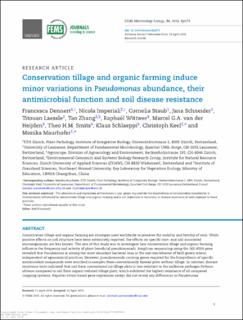Please use this identifier to cite or link to this item:
https://doi.org/10.21256/zhaw-3904| Publication type: | Article in scientific journal |
| Type of review: | Peer review (publication) |
| Title: | Conservation tillage and organic farming induce minor variations in Pseudomonas abundance, their antimicrobial function and soil disease resistance |
| Authors: | Dennert, Francesca Imperiali, Nicola Staub, Cornelia Schneider, Jana Laessle, Titouan Zhang, Tao Wittwer, Raphaël van der Heijden, Marcel G A Smits, Theo H M Schlaeppi, Klaus Keel, Christoph Maurhofer, Monika |
| DOI: | 10.21256/zhaw-3904 10.1093/femsec/fiy075 |
| Published in: | FEMS Microbiology Ecology |
| Volume(Issue): | 94 |
| Issue: | 8 |
| Page(s): | fiy075 |
| Issue Date: | 25-Apr-2018 |
| Publisher / Ed. Institution: | Oxford University Press |
| ISSN: | 1574-6941 |
| Language: | English |
| Subjects: | Pythium ultimum; Gaeumannomyces tritici; Phenazines; 2,4-diacetylphloroglucinol; Cropping system; Pyrrolnitrin; FAST |
| Subject (DDC): | 570: Biology 577: Ecology |
| Abstract: | Conservation tillage and organic farming are strategies used worldwide to preserve the stability and fertility of soils. While positive effects on soil structure have been extensively reported, the effects on specific root- and soil-associated microorganisms are less known. The aim of this study was to investigate how conservation tillage and organic farming influence the frequency and activity of plant-beneficial pseudomonads. Amplicon sequencing using the 16S rRNA gene revealed that Pseudomonas is among the most abundant bacterial taxa in the root microbiome of field-grown wheat, independent of agronomical practices. However, pseudomonads carrying genes required for the biosynthesis of specific antimicrobial compounds were enriched in samples from conventionally farmed plots without tillage. In contrast, disease resistance tests indicated that soil from conventional no tillage plots is less resistant to the soilborne pathogen Pythium ultimum compared to soil from organic reduced tillage plots, which exhibited the highest resistance of all compared cropping systems. Reporter strain-based gene expression assays did not reveal any differences in Pseudomonas antimicrobial gene expression between soils from different cropping systems. Our results suggest that plant-beneficial pseudomonads can be favoured by certain soil cropping systems, but soil resistance against plant diseases is likely determined by a multitude of biotic factors in addition to Pseudomonas. |
| Further description: | Erworben im Rahmen der Schweizer Nationallizenzen (http://www.nationallizenzen.ch) |
| URI: | https://digitalcollection.zhaw.ch/handle/11475/8545 |
| Fulltext version: | Published version |
| License (according to publishing contract): | Licence according to publishing contract |
| Restricted until: | 2021-08-01 |
| Departement: | Life Sciences and Facility Management |
| Organisational Unit: | Institute of Natural Resource Sciences (IUNR) |
| Published as part of the ZHAW project: | Vergleichende Genomik zur Abklärung der Insektenpathogenizität in Pflanzenassoziierte Pseudomonaden |
| Appears in collections: | Publikationen Life Sciences und Facility Management |
Files in This Item:
| File | Description | Size | Format | |
|---|---|---|---|---|
| 61_DennertFEMSMicrobiolEcol2018 with suppl mat.pdf | 2.88 MB | Adobe PDF |  View/Open |
Show full item record
Dennert, F., Imperiali, N., Staub, C., Schneider, J., Laessle, T., Zhang, T., Wittwer, R., van der Heijden, M. G. A., Smits, T. H. M., Schlaeppi, K., Keel, C., & Maurhofer, M. (2018). Conservation tillage and organic farming induce minor variations in Pseudomonas abundance, their antimicrobial function and soil disease resistance. FEMS Microbiology Ecology, 94(8), fiy075. https://doi.org/10.21256/zhaw-3904
Dennert, F. et al. (2018) ‘Conservation tillage and organic farming induce minor variations in Pseudomonas abundance, their antimicrobial function and soil disease resistance’, FEMS Microbiology Ecology, 94(8), p. fiy075. Available at: https://doi.org/10.21256/zhaw-3904.
F. Dennert et al., “Conservation tillage and organic farming induce minor variations in Pseudomonas abundance, their antimicrobial function and soil disease resistance,” FEMS Microbiology Ecology, vol. 94, no. 8, p. fiy075, Apr. 2018, doi: 10.21256/zhaw-3904.
DENNERT, Francesca, Nicola IMPERIALI, Cornelia STAUB, Jana SCHNEIDER, Titouan LAESSLE, Tao ZHANG, Raphaël WITTWER, Marcel G A VAN DER HEIJDEN, Theo H M SMITS, Klaus SCHLAEPPI, Christoph KEEL und Monika MAURHOFER, 2018. Conservation tillage and organic farming induce minor variations in Pseudomonas abundance, their antimicrobial function and soil disease resistance. FEMS Microbiology Ecology. 25 April 2018. Bd. 94, Nr. 8, S. fiy075. DOI 10.21256/zhaw-3904
Dennert, Francesca, Nicola Imperiali, Cornelia Staub, Jana Schneider, Titouan Laessle, Tao Zhang, Raphaël Wittwer, et al. 2018. “Conservation Tillage and Organic Farming Induce Minor Variations in Pseudomonas Abundance, Their Antimicrobial Function and Soil Disease Resistance.” FEMS Microbiology Ecology 94 (8): fiy075. https://doi.org/10.21256/zhaw-3904.
Dennert, Francesca, et al. “Conservation Tillage and Organic Farming Induce Minor Variations in Pseudomonas Abundance, Their Antimicrobial Function and Soil Disease Resistance.” FEMS Microbiology Ecology, vol. 94, no. 8, Apr. 2018, p. fiy075, https://doi.org/10.21256/zhaw-3904.
Items in DSpace are protected by copyright, with all rights reserved, unless otherwise indicated.